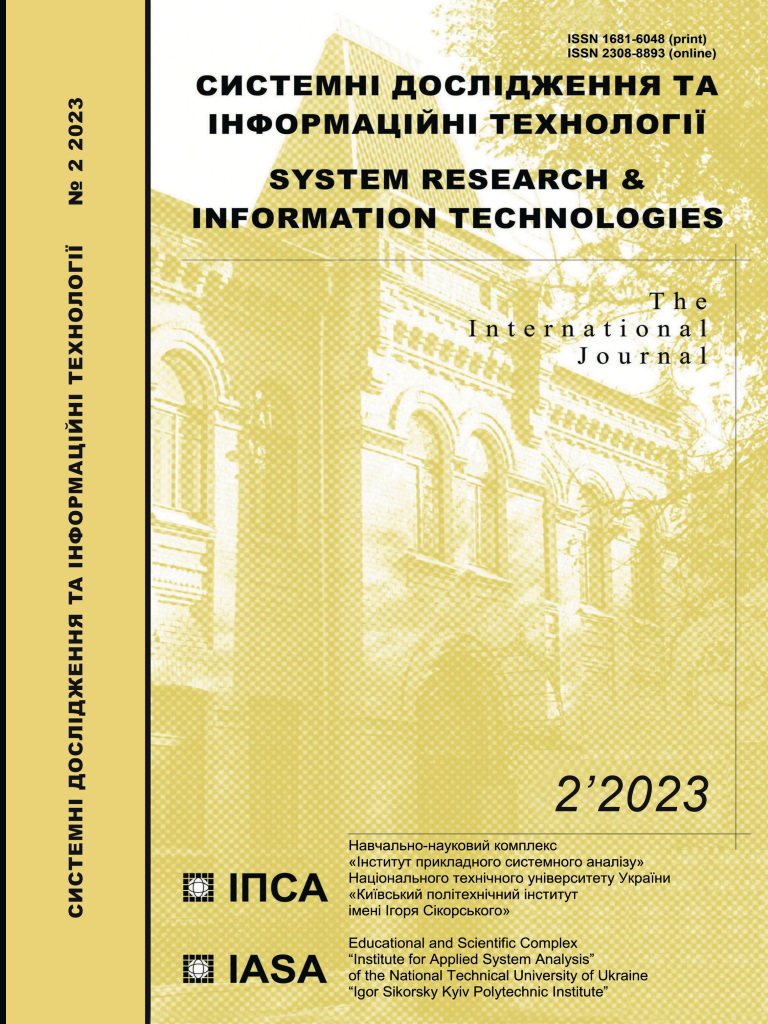Information technology for creating intelligent computer programs for training in algorithmic tasks. Part 2: Research and implementation
DOI:
https://doi.org/10.20535/SRIT.2308-8893.2023.2.03Keywords:
intelligent tutoring systems, experimental studies, results of implementationAbstract
Information technologies, particularly artificial intelligence methods, involve more and more deeply into all spheres of human activity: science, technology, art, and education. Ukraine also has sufficient potential and needs to develop educational support, which is the subject of this paper. The work aims to demonstrate the components of information technology for the creation of Intelligent Tutoring Systems (ITS), which are involved in studying various engineering disciplines. The work includes methods of system analysis, mathematical and simulation modeling, technical diagnostics, and artificial intelligence. The proposed models and methods are implemented in ITS prototypes for teaching mathematics, programming, and the automatic control theory. The Intelligent Tutoring Systems were implemented in the educational process of KhAI University and other institutions in Ukraine, Great Britain, Austria, and China. Experimental studies have shown increased student learning success rates using ITS compared to traditional methods. Improved and adapted for computer training methods of technical diagnostics, Bayesian networks, and developed models of algorithmic tasks, the learning process and the learner are valuable from a scientific point of view. In a practical sense, the obtained results can be used to create new specialized ITSs and build an expandable common learning platform integrating the basic disciplines of a specific educational field.
References
A. Chukhray, Methodology for learning algorithms: monograph. National Aero-space University “KhAI”, 2017, 336 p.
M.Z. Zgurovsky and N.D. Pankratova, System analysis: problems, methodology, applications. Kyiv: Nauk. opinion, 2011.
N.D. Pankratova, “System analysis in the dynamics of diagnosing complex technical systems,” System Research & Information Technology, no. 4, pp. 33–49, 2008.
A. Kulik, A. Chukhray, and O. Havrylenko, “Information technology for creating intelligent computer programs for training in algorithmic tasks. Part 1: Mathematical foundations,” System Research & Information Technologies, no. 4, pp. 27–41, 2021.
A. Kulik, A. Chukhray, and A. Zavgorodniy, “Similar strings detecting methods,” in Proceedings of the East-West Fuzzy Colloquium, Zittau, Germany, IPM, 2005, pp. 183-191.
J.P. Martínez Bastida, O. Havrylenko, and A. Chukhray, “Developing a self-regulation environment in an open learning model with higher fidelity assessment,” Communications in Computer and Information Science, vol. 826, pp. 112–131, 2018.
K. Zhang and D. Shasha, “Simple fast algorithms for the editing distance between trees and related problems,” Society for Industrial and Applied Mathematics. Journal on Computing, no. 18 (6), pp. 1245–1262, 1989.
A. Chukhray and O.Havrylenko, “Proximate Objects Probabilistic Searching Method,” Advances in Intelligent Systems and Computing, 1113 AISC, 2020, pp. 219–227.
A. Chukhray and O. Havrylenko, “The method of student’s query analysis while intelligent computer tutoring in SQL,” Radioelectronic and Computer Systems, no. 2 (98), pp. 78–86, 2021. doi: 10.32620/re`ks.2021.2.07.
Ie. Vagin, O. Havrylenko, J.P. Martínez Bastida, and A. Chukhray, “Computer Intelligent Tutoring System “SQLTOR,”” ICTERI2019 ICT in Education, Research and Industrial Applications. Integration, Harmonization and Knowledge Transfer, pp. 541–546. Available: http://ceur-ws.org/Vol-2387/20190525.pdf
D. Gaydachuk, O. Havrylenko, J.P.Martínez Bastida, and A. Chukhray, “Structural diagnosis method for computer programs developed by trainees,” Proceedings of 15th International Conference on ICT in Education, Research, and Industrial Applications, 2019, Kherson, Ukraine, pp. 485–490.
A. Chukhray and O. Havrylenko, “The engineering skills training process modeling using dynamic Bayesian nets,” Radioelectronic and Computer Systems, no 2 (98), pp. 87–96, 2021. doi: 10.32620/reks.2021.2.08.

